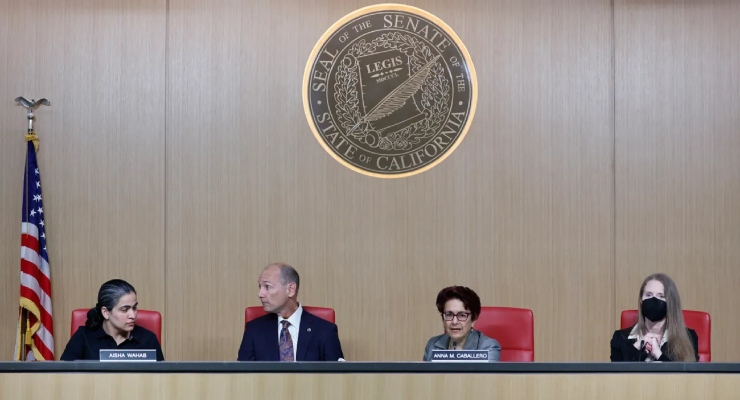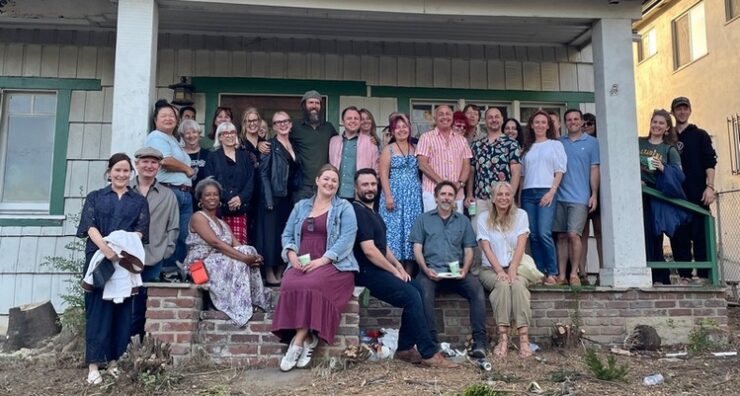
In just 24 minutes and without any debate, the most powerful committee in the state Senate last week moved 33 bills from public view into a secretive process that will decide whether the measures live or die.
Two days later, its sister committee in the Assembly moved 82 of its bills in under two minutes to the same secretive, uncertain future.
If history is any guide, between a quarter to a third of those bills will be killed next month. For most of the bills, no one but lobbyists, a handful of capital staffers, lawmakers and Gov. Gavin Newsom’s policy team will know exactly why.
So it goes with the Senate and Assembly’s appropriations committees, the gatekeepers for bills proposing to spend taxpayer money. The committees’ “suspense files” are where hundreds of bills die quietly each year. The fates of the bills that were moved to the file last week – along with dozens of others that will be added later – will be announced in a single hearing on what’s known as “suspense day” scheduled for May.
As CalMatters has reported, members of the Legislature almost never vote in public hearings to kill bills by attaching their names to a formal “no” vote. For instance, of 2,403 bills that died in the two-year session that concluded last fall, only 25 were killed by a majority of lawmakers voting “no.” Instead, bills tend to die behind the scenes. It can be incredibly difficult for members of the public to learn who killed a measure and why.
The appropriations committees’ suspense files are the most notorious example.
The opaque process frustrates some lawmakers, including Assemblymember Corey Jackson, a Democrat representing Moreno Valley. He has criticized Democratic leadership for not doing more to address homelessness, inequality and people moving out of state.
“The way we treat the appropriations process is a non-democratic process; I believe that it’s a corrupt process,” Jackson said.
Per decades-old policy, any bill that’s estimated to cost taxpayers at least $50,000 gets placed on the suspense file. Twice a year – once in May and again in August – the committees announce which bills move bills off of “suspense” and can advance through the Legislature.
Last summer, the committees culled about a third of the 830 bills that had been placed on suspense. Some of them were controversial.
Republicans were outraged that the committee didn’t vote on their bill seeking to add new requirements before state officials could place “sexually violent predators” in communities.
The Senate’s top Republican, Sen. Brian Jones of San Diego, accused Democratic leaders of protecting “predators over families.”
But some Democrats, including Jackson, also were frustrated. Jackson had a child tax credit bill die in the suspense file. Asked last week if he knew who was responsible for killing the bill, Jackson said, “That’s part of the process. You don’t know in many cases.”
When cost estimates kill California bills
Other Democrats last summer also accused the Newsom administration of inflating cost estimates to kill health care legislation the governor’s team didn’t like through the suspense process. The Newsom administration insisted its estimates were accurate.
“The administration looks forward to tackling some of the most pressing policy challenges with the Legislature, but doing so within the confines of our budgetary constraints,” Christian Beltran, legislative director for Newsom’s Department of Finance, told the Senate Appropriations Committee last week.
Last week, the 82 bills that moved to the Assembly appropriations suspense file included measures on overnight parking for homeless students, vending machine prices in prisons and corporate homeownership.
In the Senate committee, measures on indigenous missing persons cases, gun-dealership inspections and the formation of a California Latino Commission were all moved to the suspense file.
Now the behind-the-scenes work begins for lobbyists such as Chris Micheli, who is advocating for a bill that was moved last week to suspense.
“You’re going to have conversations with the staff of the committee and the members of the committee, particularly the chair, who is most influential in terms of what bills, you know, stay or go,” Micheli said.
Appropriations chairs make hard calls
Former chairs of the appropriations committees – called “approps” in Capitol shorthand – told CalMatters it can be a difficult position to be in. The chairs often have to make tough decisions to kill particularly controversial, poorly thought out or expensive bills that the leaders of the other legislative committees didn’t want to make.
“I would get angry with people,” said Lorena Gonzalez, a former Democratic assemblymember from San Diego who is now president of the California Labor Federation. “I’d have policy (committee) chairs come to me and they’re like, ‘Oh, I couldn’t kill these. But here are the bills I think you should kill.’ I’m like, you know, ‘Grow some balls.’ ”
Plus, chairs also have to deal with colleagues who take it personally when their favorite bills are killed.
Mike Gatto, a former Democratic Assembly appropriations chair from Los Angeles, said he faced intense blowback from some colleagues. He said one fellow Democrat targeted him during a reelection campaign after Gatto killed his bill in suspense. Another retaliated by killing one of Gatto’s bills in a different committee.
“My mandate was to engage in a cost-benefit analysis for the good of the state, to make sure that we did not spend any more than we had,” Gatto said. “Maybe I took the mandate too seriously, or maybe I was not that great with managing human relationships, but I ended up having a number of very upset colleagues.”
Gonzalez said she didn’t think it was fair to call the suspense file process secretive. She said anyone can review the committee’s fiscal estimates and its analyses and weigh in.
But in the end, it’s the chairperson who usually has to take the heat.
“‘I think everybody leaves being approps chair with a lot of people upset with them,” she said.
Digital Democracy transcription manager Hans Poschman contributed to this story.
CalMatters.org is a nonprofit, nonpartisan media venture explaining California policies and politics.














 1 comment
1 comment


